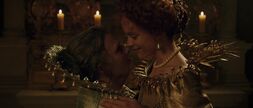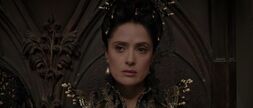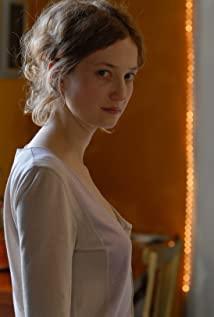Because this is not a complete and smooth story, but a theme mixed with three stories: the absurdity and exaggeration of human nature.
The film is based on the ancient European dialect fairy tale collection "Five Days Talk", telling the stories of three neighboring countries.
The three stories follow the usual routines of European and American fairy tales, with elements such as palaces, castles, princes, princesses, savages, wizards, and fairies.
http://resource.jingkan.net/imgs/8bd68190-bde9-11e7-9ed1-7d83446e4e17.jpg
This movie may only have one theme, but it has three main lines, regardless of priority, and they go forward side by side.
The plot of the story is constantly intertwined, and it is impossible to imagine how the plot will develop. Even after the movie is over, I am still in a state of ignorance, and I don't know what I have watched.
It was only after two days of rumination that a little taste came out.
That's the charm of this movie.
Most obviously, the film is about a balancing act between desire and cost.
But behind the imbalance of desire is a tragedy about love.
Magic, perversion, violence, and reality are the four key words of this film.
http://resource.jingkan.net/imgs/8bd76bf0-bde9-11e7-9ed1-7d83446e4e17.jpg
01
The first story is the story of the queen and the prince.
A beautiful and noble queen, who is not satisfied with the favor of the king alone, she also wants a child. Then the king, in order to fulfill her wish, took the risk of killing the sea monster, and unfortunately died. The queen didn't even shed any tears, she got the sea monster's heart and turned to leave.
The weight of love in her eyes is not as good as her own wish. Really sad to think about it.
She got a son and gave him all her love. In return for her son's demands, she was unconditional obedience. She didn't allow him to run outside the palace or play with commoner friends. As her son rebelled and left again and again, her desire for control reached its peak.
She asked the wizard to turn herself into a monster and ran into the forest to kill the prince's friends, only to be stabbed to death by the coming prince.
Before dying, it shed tears of remorse.
This is the tragedy of mother-son love.
http://resource.jingkan.net/imgs/8bd79300-bde9-11e7-9ed1-7d83446e4e17.jpg
02
The second story is the story of a lecherous king and a vain old woman, an old woman sister.
The king was attracted by the old woman's singing, thinking it was a young and beautiful woman, so he came to court.
The old woman took advantage of the night to get into the king's bed. When the king woke up and found that he had been tricked, he threw her out of the window and out of the cliff in a fit of rage.
The old woman survived the hardship and was turned into a young beauty by the fairy. The king found her while hunting, and brought her back to the palace to seal her up.
At the end of the movie, the queen's face is rapidly aging, and he is indifferent when he sees it. Because at that moment, his love was over.
It turned out that the king's love was based on beauty. It was for this reason that he suffered the loss of the old woman.
His palace has rows and rows of portraits of women who have never received true love. Even if he was surrounded by thousands of flowers, he still couldn't fill the emptiness in his heart.
This is the tragedy of the king's love.
http://resource.jingkan.net/imgs/8bd79301-bde9-11e7-9ed1-7d83446e4e17.jpg
The second story also contains a pair of sister stories.
The old woman and sisters were originally dependent on each other, and the sisters were deeply in love.
The king sent someone to give a necklace, and the sister immediately put it on her neck, measured it for her sister, and put it away immediately.
She didn't think about sharing at all, she just wanted to monopolize.
After the old woman turned into a beautiful girl and was brought into the palace, she gave her sister a fancy dress for her to attend the wedding.
She didn't want to share wealth and honor with her sister, but she actually had more to show off, because nothing could satisfy her vanity more than letting sisters who used to be poor and lowly see her become rich and wealthy.
Afraid that others would know her secret, her sister immediately asked her to leave after the wedding. And the younger sister who got nothing wanted to stay, but was finally driven out mercilessly.
The younger sister asked how to become young and beautiful. The elder sister did not tell her that she had met a fairy, but only said that she had peeled a layer of her skin.
The younger sister believed it to be true, so she was skinned for herself.
Vanity, jealousy and greed in human nature are undoubtedly revealed in the story.
The sisterhood of blood is thicker than water, in front of vanity, is not worth mentioning at all.
http://resource.jingkan.net/imgs/8bd7ba10-bde9-11e7-9ed1-7d83446e4e17.jpg
03
The third story, the story of the king and the flea, the princess and the savage.
The king, who looked noble but was foolish, kept a flea as a pet.
He pricked his finger and used his own blood to raise the flea, playing with it, putting all his energy on it, and turning a flea into a giant. Later, the flea died, and he was sad to die.
But he was perfunctory to his daughter again and again, and even shattered her daughter's love fantasy with his own hands.
The princess told him that the conditions for choosing a mate were to be brave, strong, and most importantly, to be handsome.
He was full of promises, and turned his head to playfully use this flea skin to choose his consort. Then, forced her daughter to marry an ugly savage.
The princess accused her father, you are not even better than the beast, at least the beast knows how to protect the cub.
Instead of showing a bit of sadness and guilt, he was furious at being accused.
For his own sake, he was extremely cold.
He did not give his daughter any dowry, so he drove her out of the castle and let the savages take her away.
The daughter is not as good as a flea, there is no father-daughter relationship.
http://resource.jingkan.net/imgs/8bd7ba11-bde9-11e7-9ed1-7d83446e4e17.jpg
This marriage seems unsuitable to everyone, but it is actually reasonable and legal. Because this was won by the savages with their own experience and knowledge, rather than robbing them.
However, the princess is also innocent, she is just the victim of a game of conceit played by her father. She does not approve of such a marriage from the bottom of her heart.
The princess was trapped on a cliff by a savage and drank blood.
At the princess' begging, the entertainer's family across the cliff extended a helping hand to the princess. On the way to escape, the family was brutally murdered by savages. The princess escaped alone and designed to kill the savages.
The tragedy is that the savage, who looks stupid and stupid, just wants to take back his wife, but no one sympathizes with him.
He is just ugly, but not a villain, and he is even kind to the princess. The bad is in his appearance. In order to regain her freedom, the princess had to sacrifice him.
But an unsuitable marriage turns into a tragedy.
http://resource.jingkan.net/imgs/8bd7ba12-bde9-11e7-9ed1-7d83446e4e17.jpg
04
Every story is a relationship that is out of balance because of desire, a tragedy of love.
The movie is full of various metaphors, such as monsters, fleas, and savages are symbols of extreme selfishness.
They appear in wildly exaggerated form, absurd and abrupt, but add to the dramatic effect of the film. And their final death made this tragedy even more profound.
As long as human beings have desires, this tragedy will not stop.
At the end of the story, the princess returns from a bloodbath and is crowned queen. Some say it's a symbol of feminism.
In my opinion, the upper position of the princess is indeed the control of fate, but it also implies the birth of another desire.
A new cycle is about to begin.
Therefore, there is a scene of high-altitude tightrope walking at the end of the film.
This is a metaphor that both echoes the balance the wizard said at the beginning, and also hints at the beginning of a new round of balance games.
http://resource.jingkan.net/imgs/8bd7e120-bde9-11e7-9ed1-7d83446e4e17.jpg
05
The drama of the movie, in addition to the incredible storyline, also laid the groundwork with many details.
The first is comparison.
In the first story, the queen was frowning when she watched the performance without her son, but she was smiling when she watched the performance with her son. In the second story, the king's attitude toward the old woman is one of contempt and one of admiration. In the third story, the king has love for the flea and is ruthless to his daughter. These contrasts are more dramatic than direct satire.
Secondly, it is something that has its own dramatic effect.
The street performers who appeared at the beginning of the movie, as well as the performers who appeared in every story, the entertainer's family who arranged to save the princess, and the last tightrope walker. Another example, the queen turned into monsters, fleas and savages.
The more I think about it, the more I feel that the director's skill is as unfathomable as a martial arts master.
Of course, more dramatic than these are their desires and life.
Finally, I recommend this movie again.
The composition, setting, color and photography are really brilliant, which shows the director's skill.
Just a few screenshots for everyone to enjoy.
http://resource.jingkan.net/imgs/8bd7e121-bde9-11e7-9ed1-7d83446e4e17.jpg
http://resource.jingkan.net/imgs/8bd7e122-bde9-11e7-9ed1-7d83446e4e17.jpg
View more about Tale of Tales reviews











